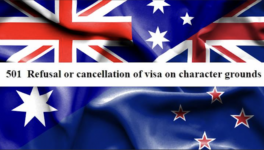NZ High Court Rules that Supervising Deportees On Arrival is a Rights Violation

New Zealand High Court Justice Cheryl Gwyn, on 19 December, released her ruling relating to an NZ born man who was deported from Australia, under the terms of the character test contained in section 501 of the Migration Act 1958 (Cth).
The 501 deportee was challenging the NZ police commissioner having determined him to be a “returning prisoner” under local laws specifically enacted to deal with Australian deportees, and, therefore, he warranted being placed on two years extended supervision within the community.
Justice Gwyn found that to impose a probation-like order on the man, who arrived in Australia in 1991 at the age of 5 and was deported in 2019, was to breach his protection against retrospective punishment, which is guaranteed in section 25(g) of the New Zealand Bill of Rights Act 1990.
Her Honour further set out that the placing of an extended supervision order upon the deportee, who’d been convicted of drug offences, in order to monitor him whilst living amongst the NZ community, after he’d served his time in an Australian prison, constitutes double punishment.
And NZ justice minister Kiri Allan told the press on 21 December that her ministry was aware of the judgement and it was deliberating upon the implications.
Dumping offenders
Abbott government immigration minister Scott Morrison amended the Migration Act in late 2014, to tighten the section 501 character test, so that a noncitizen is now automatically deported after being sentenced to at least 12 months imprisonment, which can apply to multiple sentences.
Since the amendments took hold, these laws have seen over 7,000 noncitizens, often long-term residents who’ve lived here for decades, deported. And the largest cohort of deportees has been New Zealand born residents.
In October this year, there were more people in Australian onshore immigration detention who were born in New Zealand than any other nation on Earth, and this has been the case over the overwhelming majority months since June 2016.
NZ prime minister Jacinda Ardern has consistently told our government to stop sending Australian produced criminals to her country.
While NZ police commissioner Andrew Coster said earlier this year that his nation’s criminal culture was changing due to the influx of Australian deportees.
“At some level, what we have had through the deportation of those offenders to NZ is replication of the Australian environment,” the top cop explained.
And in terms of whether the flow of deportees will be curbed, Australian PM Anthony Albanese suggested in July that his government was contemplating the possibility of changing the system, so that long-term residents born in New Zealand may no longer be sent across the Tasman Sea.
Finding a solution
On Friday, NZ Crown Law successfully applied for a stay on last week’s High Court proceedings, so the decision to quash the classification of that specific deportee as a returning prisoner, as well as his accompanying supervisions orders, does not affect the circumstances of other 501 deportees.
In the wake of this significant decision, the NZ justice minister has explained that the stay, which was granted last Friday, is a temporary option that will serve to ensure NZ police and corrections will have the power to deal with 501 deportees until a longer-term solution is found.







